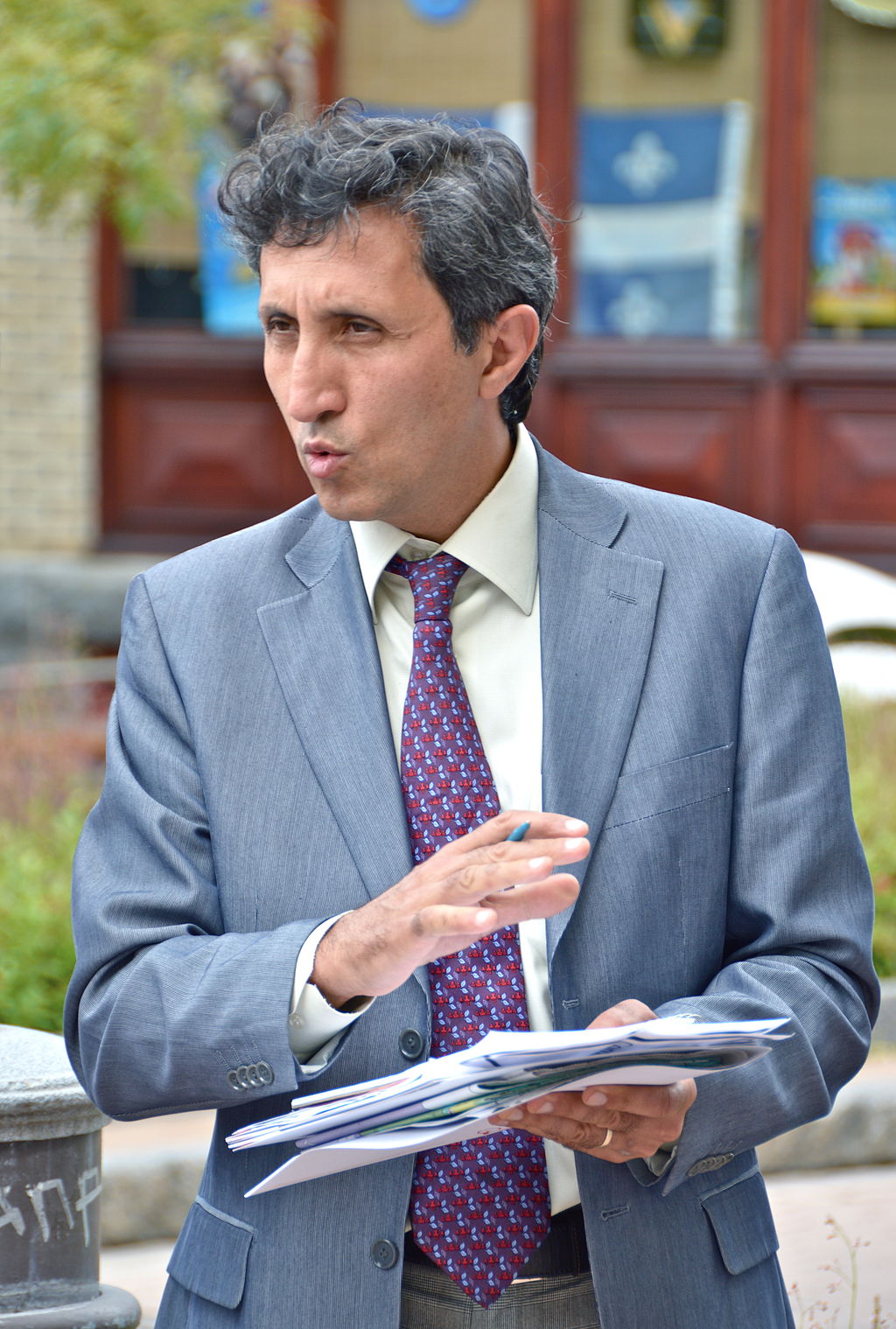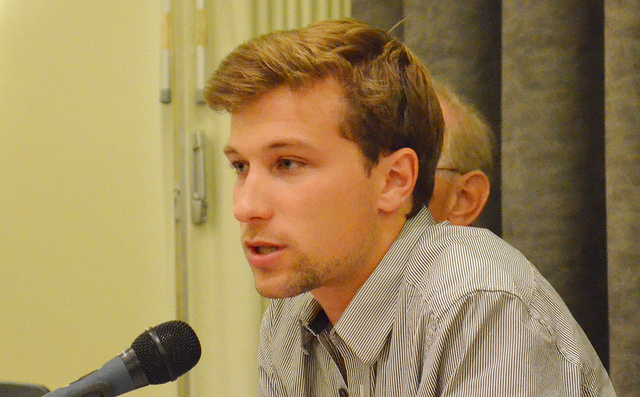Khadir, physicist, doctor, activist and politician (born 12 June 1961 in Tehran, Iran). Amir Khadir was spokesperson for Québec solidaire from 2006 to 2013 and the first member of this left-wing political party to be elected to the National Assembly of Quebec.
Education, Professional Training and Social Activism
Amir Khadir arrived in Quebec in 1971 at the age of 10. His family sought political asylum in Quebec after fleeing the dictatorship of the Shah of Iran. Among other things, his father, Jafar Khadir, professor of mathematics, had been arrested by police for speaking to his students about issues that were taboo within the regime, such as petroleum revenues and poverty.
Amir Khadir was interested in literature, poetry and philosophy as a teenager, but later turned to physics. When he was studying in college and university, Iran was going through a time of tremendous upheaval. This included a popular revolution led by students, a general strike by unions and the unemployed, the exile of Shah Mohammad Reza Pahlavi and his family in 1979, and the proclamation of the Islamic Republic of Iran by Ayatollah Khomeini. Like many other Iranian Canadians, the Khadir family followed the events in their country of origin very closely. Amir Khadir supported the revolution at first, but opposed the Islamic Republic that grew out of it. He was the president of an association of Iranian students in Canada and was an activist with the Canadian chapter of the Committee for the Defence of the Iranian People’s Rights. He interrupted his studies for two years (1981–1983) to devote himself to politics.
In 1985, he co-founded the Iranian Cultural and Community Centre in Montréal and coordinated its activities for three years. He obtained a master’s degree in physics from McGill University in 1987 and then decided to study medicine. In 1990, he completed his PhD at Université Laval and went on to specialize in microbiology and infectious diseases at the Université de Montréal. In 1997, he was hired at the Pierre-Le Gardeur Hospital in the northern Montréal suburb of Terrebonne.
During his studies in medicine, Khadir was an intern and then coordinator of the Santé Tiers-Monde (Third World Health) group at the Faculty of Medicine of Université Laval (1986–89). He participated in several humanitarian projects in Nicaragua (1987), Zimbabwe (1990), and India (1997). From 1998 to 2008, he provided medical assistance in Palestine and for the Caravane d’amitié Québec-Cuba. From 2000 to 2002, he headed Doctors of the World emergency medical assistance missions in several countries, including Afghanistan.
In early 2003, Khadir was a member of a humanitarian delegation to Iraq, as was Françoise David. The purpose was to gather up-to-date information on the effects of economic sanctions on the Iraqi people and to provide humanitarian aid. From 2001 to 2004, Khadir was chair of the board of directors of Solidarité, union, coopération (SUCO), a Canadian organization supporting the sustainable development of communities and providing education in international solidarity. In 1998, he became a member of the Coalition des médecins pour la justice sociale, an organization opposed to privatization of the Quebec health care system. In 2004, he wrote the preface to L’envers de la pilule by Jean-Claude St-Onge. The work exposed the pharmaceutical industry and exorbitant drug prices.
Politics was always important to Khadir, and he became a member of the Rassemblement pour l’alternative progressiste (RAP) in 1997. In the 2000 federal general election, he was a Bloc Québécois candidate in the constituency of Outremont, finishing second to Liberal MP Martin Cauchon by 28 per cent of the vote.
MNA and Spokesperson for Québec solidaire
In 2005, Khadir co-signed the Manifeste pour un Québec solidaire along with a number of other public figures in response to the Manifeste pour un Québec lucide, the publication of which was spearheaded by former Quebec Premier Lucien Bouchard. He became the spokesperson for the Union des forces progressistes, a new party resulting from the merger of the RAP, the Parti de la démocratie socialiste, and the Communist Party of Québec. In the 2003 Quebec general election, he ran in the Montreal constituency of Mercier. No MNA was elected from his political party, which received only 1 per cent of the popular vote, but Khadir himself managed to garner 18 per cent of the votes in his constituency.
On 4 February 2006, he co-founded a new political party called Québec solidaire, formed by the merger of the Union des forces progressistes and Françoise David’s Option citoyenne. Khadir and David were selected as spokespersons for the new political party, which was officially recognized by the Directeur général des éléctions (Chief Electoral Officer) a few days later.
In the 2007 Quebec general election, he ran in the constituency of Mercier, but the Parti Québécois incumbent Daniel Turp prevailed. In the next election on 8 December 2008, Khadir was elected in Mercier by a margin of 810 votes over the incumbent, winning 38 per cent of votes cast in a constituency with a voter turnout of 56 per cent. He thus became the first candidate of a left-wing party to be elected to the National Assembly.
For nearly four years, he was the only Québec solidaire member of the National Assembly. He was known for his outspokenness and his verbal attacks. The most highly publicized attack was the one he launched against Henri-Paul Rousseau, former chairman and CEO of the Caisse de dépôt et placement du Québec (Quebec Investment Corporation). During Rousseau’s May 2009 appearance before a parliamentary committee examining the $40-billion loss suffered by the Caisse, Khadir said: [Translation] “You are one of these new monarchs who believe that they may do as they please and that they are above the law. Arrogance and disdain are often signs of cowardice, and you elected to resign in the midst of the storm.”
In the 4 September 2012 Quebec general election, Khadir was re-elected in his constituency of Mercier and Françoise David joined him in the National Assembly. On 5 May 2013, Andrés Fontecilla replaced Khadir as the male spokesperson for Québec solidaire. In the April 2014 election, Khadir and David were both re-elected. Manon Massé joined their ranks as the third Québec solidaire MNA with more than 30 per cent of the votes in her constituency.
Controversies
MNA Khadir was embroiled in a number of controversies following his election in 2008. The most highly publicized incident was when he hurled a shoe at an effigy of then-president George W. Bush in front of the United States consulate in Montréal — an act for which he later apologized. In the fall of 2010, he sponsored a petition on the National Assembly website calling for the resignation of Premier Jean Charest. The petition garnered 247,379 signatures, the most for any electronic petition in Quebec history.
In the spring of 2012, Khadir supported the student movement against tuition hikes (see 2012 Québec Student Strike), as did many other public figures. On 18 May 2012, he invited the people of Quebec to consider civil disobedience following passage of the Charest government’s Bill 78. In early June 2012, he was arrested by police for participating in an illegal demonstration. He defended his actions by referring to Martin Luther King Jr. and Gandhi and saying: [Translation] “I did what Martin Luther King would have done and what Gandhi would have done. I am not comparing myself to them, but they are our role models.” This statement was ridiculed by several political figures, including Gilles Duceppe.
Legacy
Amir Khadir is passionate about issues neglected by other elected officials and tackles those issues with great conviction. His eloquence, energy and social activism make him a key figure in Quebec politics. In addition to taking on the issue of drug prices, he condemned chrysotile asbestos mining and the meagre royalties mining companies pay the Quebec government (see Mining). He spoke out on behalf of the residents of Malartic in the Abitibi Region who were faced with expropriation, and he called for a moratorium on uranium mining in the Côte-Nord region. Khadir and his team brought to light straw man schemes through which engineering firms could illegally finance the main Quebec political parties, and he was the first MNA to call for a public inquiry on political party financing. This led to the creation of the Charbonneau Commission (Commission of Inquiry on the Awarding and Management of Public Contracts in the Construction Industry) in the fall of 2011.

 Share on Facebook
Share on Facebook Share on X
Share on X Share by Email
Share by Email Share on Google Classroom
Share on Google Classroom




